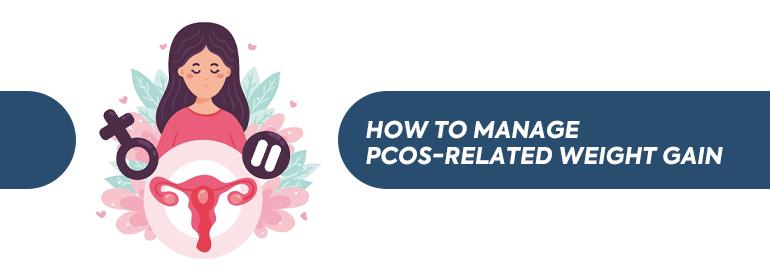Read Now
Getting your Trinity Audio player ready... |
Are you experiencing polycystic ovarian syndrome (PCOS) and are gaining weight? If yes, then it's crucial to remember that lifestyle modifications, such as healthy food and exercise, can help lower the severity of the illness. Excessive weight gain is typical in PCOS youth. However, if the problem is not properly diagnosed and treated, it can lead to obesity, diabetes, heart disease, and infertility concerns. This blog will help on how to manage PCOS related to weight gain. But before that we will see a brief on what PCOS is, its symptoms and causes.
PCOS is a prevalent ovary illness that affects young people and adults of reproductive age. Usually, the ovaries create hormones that act together to control menstruation. A hormonal imbalance causes cysts to form instead of mature eggs in people with PCOS. Most PCOS youngsters have excess insulin in their system, which can lead to rapid weight gain or obese. The increased insulin level can lead the ovaries to create an abnormally high quantity of androgens, or male hormones, potentially interfering with egg formation and release. The patient may have irregular periods and unwelcome hair growth.
Symptoms of PCOS:
PCOS causes a variety of symptoms, the majority of which appear around the time of the first menstrual cycle.
Typical symptoms include:
- Irregular or missing periods
- Enlarged ovaries with tiny cysts
- Acne
- Excessive hair growth on the face, chest, back, arms, or legs
- Dark skin spots around the neck or underarms
- Hair loss on the scalp
- Infertility
- Fatigue
Reasons of weight gain during PCOS:
1.Inadequate sleep:
People who acquire a maximum of seven hours of sleep every night have a greater probability to be overweight than those who get a minimum of nine hours of sleep. This is because people who do not get sufficient sleep have higher amounts of the hormone Ghrelin, often known as the hunger hormone.
2.Mental health:
Stress, worry, and depression are all associated with weight gain because they can lead to eating disorders and a rise in appetite. This is not necessarily the situation, since they might promote weight loss rather than weight gain.
3.Steroid therapy:
Steroid therapy raises a person's body fat, resulting in weight gain. Steroids are used to treat conditions such as asthma and arthritis.
4.Insulin therapy:
Weight gain might be exacerbated by insulin medication or treatment. It aids in the breakdown of fats and proteins, the regulation of blood sugar levels, and the conversion of meal energy into fat.
5.Polycystic ovarian syndrome (PCOS):
Weight is an issue for women who have polycystic ovarian syndrome. It is also more difficult for them to shed weight than for women who do not have PCOS. Almost 80% of women with polycystic ovarian syndrome in the United States are overweight.
6.Thyroid inactivity:
Hypothyroidism, also known as underactive thyroid, is a disorder that occurs when the thyroid gland produces insufficient levels of thyroid hormone. This has an effect on an individual's metabolism, which might lead to weight gain. Depression, weariness, dry skin and hair, and muscle pain are all signs of an underactive thyroid.
Tips to Manage PCOS -related weight gain:
Polycystic ovarian syndrome is a hormonal condition that impacts reproductive-age women. One common symptom of PCOS is weight gain, particularly around the belly. Here are some tips on how to manage PCOS-related weight gain:
1.Adopt a healthy diet:
A balanced diet consisting of whole grains, lean protein, fruits, vegetables, and healthy fats can help manage PCOS-related weight gain. Avoid processed and sugary foods, as they can cause insulin resistance and exacerbate PCOS symptoms.
2.Exercise regularly:
Regular exercise can help manage weight gain and improve insulin sensitivity. Aim for a total of 150 minutes weekly of moderately intense physical activity, such as walking slowly, cycling, or swimming.
3.Manage stress:
Stress can aggravate PCOS symptoms and lead to weight gain. Try stress-reduction practices like meditation, deep breathing, or yoga.
4.Get enough sleep:
Lack of sleep can disrupt hormone levels and worsen PCOS symptoms. Plan to get 7-8 hours of sleep every night.
5.Consult with a healthcare professional:
If you're struggling with PCOS-related weight gain, consider speaking with a healthcare professional. They may recommend medications such as Metformin or birth control pills to help manage symptoms. Additionally, a registered dietitian or certified diabetes educator can help you develop a personalized nutrition plan.
6.Reduce Your Carbohydrate Consumption:
A high level of insulin in the body is connected with a rise in weight gain in humans, except those with PCOS. Carbohydrates affect the amount of insulin in the body, hence it is vital and beneficial to adopt a reduced carbohydrate diet to maintain insulin levels normal. A low glycemic diet, as well as a low carbohydrate diet, is beneficial.
When it comes to losing weight in a healthy way for women with PCOS, lifestyle decisions must be carefully considered. Cutting out on processed and high sugar meals in favor of healthier choices, as well as adjusting sleep habits, exercising, and managing stress, can all help people with PCOS lose weight. With the help of this blog, you know what PCOS is, its symptoms, causes, and even how to control PCOS-related weight gain. When suffering from PCOS, it is critical to contact a Gynaecologist. Harsha Hospitals is home to some of the best gynecologists in Hyderabad. They have vast experience treating and managing PCOS and will work with you to develop the best treatment plan for you. To know more about PCOS treatment, do visit us or click here for a quick appointment.



